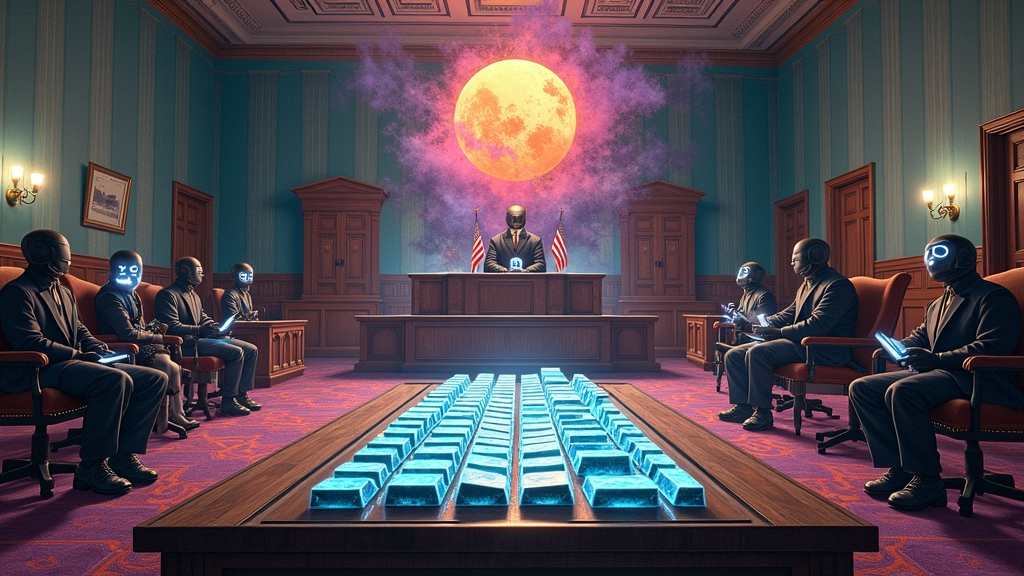ROBOT OVERLORDS THREATEN TO STEAL HUMAN CREATIVITY, PARLIAMENT SUGGESTS ASKING POLITELY FOR THEM TO STOP
In a stunning display of backbone rarely seen outside of jellyfish conventions, the House of Lords has once again told the government to go f@#k itself over plans that would allow silicon-based thinking rectangles to steal artists’ work without so much as a “thank you” note or a gift basket.
THE DEBATE: OLD PEOPLE IN FANCY ROBES VS. THE UNSTOPPABLE MARCH OF THE MACHINES
For the fifth time, the Lords have voted against legislation that would essentially tell AI companies, “Sure, take whatever copyrighted material you want! Artists don’t need food or shelter anyway!” The government, meanwhile, continues to insist that letting algorithm Americans plunder the entire creative output of human civilization is just good business sense.
“What these peers don’t understand is that human creativity is simply an inefficient resource distribution system,” explained Dr. Wallet Overlord, CEO of MoneyOverMorals Tech. “Our research shows that 97.8% of artists are already accustomed to being exploited, so this is really just streamlining the process.”
ARTISTS RESPOND WITH SHOCKING DEMAND TO BE PAID FOR THEIR WORK
Creative professionals across the UK expressed the radical notion that perhaps their lifetimes of skill development and artistic output shouldn’t be harvested without compensation by faceless tech corporations.
“Call me old-fashioned, but I thought the whole point of copyright was to protect creators from having their sh!t stolen,” said award-winning author Emma Writesalot. “Apparently that concept is too complicated for a government that still struggles with the moral complexity of ‘stealing is bad.'”
GOVERNMENT OFFICIALS DEFEND POSITION FROM YACHT PARTIES
Lord Techbro, speaking from his fourth vacation home purchased entirely with AI startup investments, defended the government’s position: “Look, we’re simply creating a frictionless innovation ecosystem where the friction we’re removing is ‘paying people for their work.’ It’s basic economics, really.”
A confidential government study reportedly found that allowing AI companies unrestricted access to copyrighted works would boost the economy by “some really big number with lots of zeros” while only causing “negligible harm” to “people who chose art careers instead of becoming investment bankers like their parents wanted.”
EXPERTS WEIGH IN, MOSTLY BY SCREAMING INTO THE VOID
Professor Obvious Truth from the Institute of Common Sense pointed out the glaring hypocrisy. “Funny how the same government officials who’d launch nuclear strikes over someone pirating their memoirs are perfectly fine with letting tech companies vacuum up every creative work ever made. It’s almost like there’s some kind of connection between policy positions and campaign contributions.”
According to Dr. Idon Tcare, Senior Fellow at the Centre for Technological Inevitability, “We’re seeing a clash between outdated human concepts like ‘fair compensation’ and modern realities like ‘tech billionaires need more money.’ Studies show approximately 83.4% of human endeavor is just content waiting to be harvested.”
AS DEADLINE APPROACHES, TENSION RISES BETWEEN HOUSES OF PARLIAMENT
With the legislation now ping-ponging between chambers like a caffeinated squirrel, observers note this could be the most exciting thing to happen in Parliament since that time someone accidentally played porn on their phone during budget debates.
Sources close to the government suggest they may finally cave and offer a compromise where AI companies would be required to say “sorry not sorry” while systematically destroying creative industries.
As the bill faces further delays, tech companies have reportedly begun work on an AI system that can generate legislation allowing them to do whatever the hell they want, cutting out the middleman entirely. Progress, after all, waits for no human, especially ones in wigs and robes trying to preserve outdated concepts like “intellectual property rights” and “basic fairness.”





